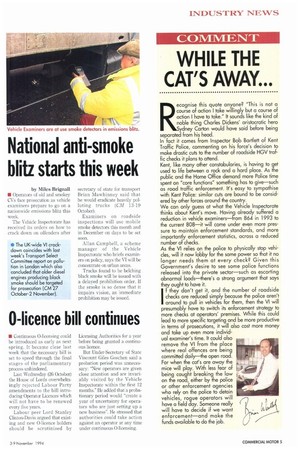WHILE THE CAT'S AWAY...
Page 7

If you've noticed an error in this article please click here to report it so we can fix it.
Rsecognise this quote anyone? "This is not a course of action I take willingly but a course of action I have to take." It sounds like the kind of noble thing Charles Dickens' aristocratic hero ydney Carton would have said before being separated from his head. In fact it comes from Inspector Bob Bartlett of Kent Traffic Police, commenting on his force's decision to make drastic cuts to the number of roadside HGV traffic checks it plans to attend. Kent, like many other constabularies, is having to get used to life between a rock and a hard place. As the public and the Home Office demand more Police time spent on "core functions" something has to give—such as road traffic enforcement. It's easy to sympathise with Kent Police: similar cuts are bound to be considered by other forces around the country. We can only guess at what the Vehicle Inspectorate thinks about Kent's move. Having already suffered a reduction in vehicle examiners—from 864 in 1993 to the current 808—it will come under even more pressure to maintain enforcement standards, and more importantly enforcement statistics, across a reduced number of checks.
As the VI relies on the police to physically stop vehicles, will it now lobby for the some power so that it no longer needs them at every check? Given this Government's desire to see some police functions released into the private sector—such as escorting abnormal loads—here's a strong argument that says they ought to have it. If they don't get it, and the number of roadside checks are reduced simply because the police aren't around to pull in vehicles for them, then the VI will presumably have to switch its enforcement strategy to more checks at operators' premises. While this could lead to more specific targeting and be more productive in terms of prosecutions, it will also cost more money and take up even more individual examiner's time. It could also remove the VI from the place where real offences are being committed daily—the open road. For when the cat's are away the mice will play. With less fear of being caught breaking the law on the road, either by the police or other enforcement agencies who rely on the police to detain vehicles, rogue operators will have a field day. Someone really will have to decide if we want enforcement—and make the funds available to do the job.
































































































